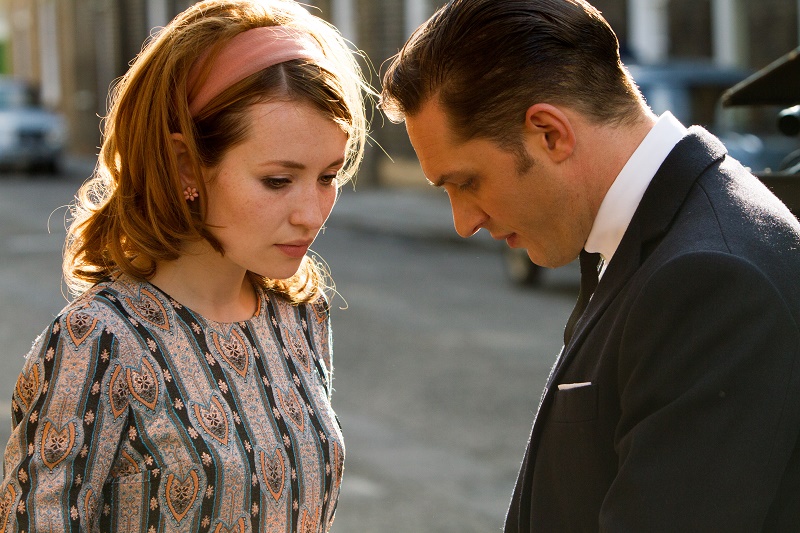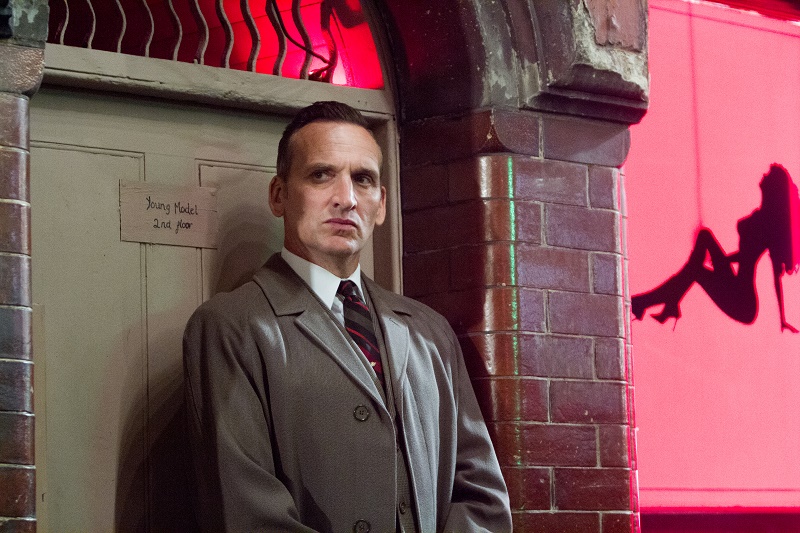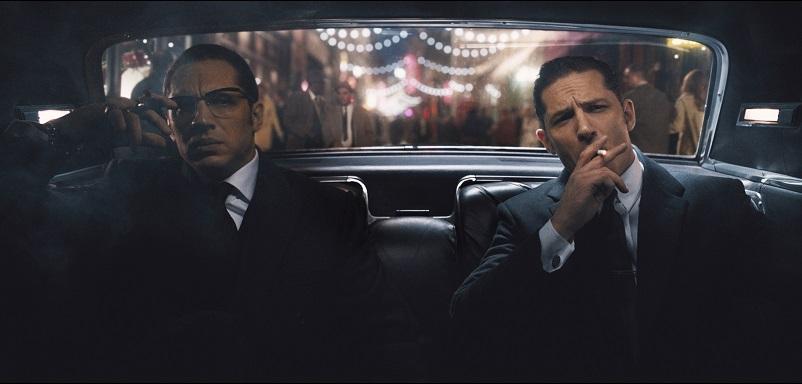Gangland London has never really worked for British directors. The warped poetry and seedy glamour of the American Mafia were the making of Coppola and Scorsese. You don’t get a lot of that down Bethnal Green way. Just knuckle dusters and glottal stops. But what happens if an American has a go at the Krays instead?
Writer-director Brian Helgeland knows his way around screen violence - he scripted LA Confidential – and he has been a tourist in England before: he paid a knockabout visit to the Middle Ages with A Knight’s Tale. The traditional thing to say about foreign directors on such occasions is that they bring the outside eye of an anthropologist. He has certainly come at well-trodden terrain from a novelty angle, telling the story through the eyes of Reggie’s mousy muse Frances Shea who – and do look away for the rest of this paragraph if you don’t know what happened to her – took an overdose and done herself in. According to Legend, Reggie lost control of himself and his empire after that.
 To underpin the idea of looking in from the outside, Helgeland cast an Australian actress – Emily Browning (pictured with Hardy as Reggie Kray) – as Frances. All Cupid’s bow and cockney vaals, she does a flawless job of turning herself into, in effect, Gemma Arterton’s titchy sister. But the stellar turn in Legend is of course Tom Hardy. Make that turns. Hardy asked to play both brothers perhaps to prove that, forever typecast as monosyllabic brutes, he really can do the villains in different voices. He is sensational. His Reg is all plausible charm and business-like thuggery, with only the odd eye twitch to hint at the coiled menace within. His overtly homosexual Ronnie is a jaw-clenched, hard-staring psychopathic panto dame. The memory of Gary and Martin Kemp in the so-so 1990 biopic has been clad in concrete boots and flung in London’s dirty old river.
To underpin the idea of looking in from the outside, Helgeland cast an Australian actress – Emily Browning (pictured with Hardy as Reggie Kray) – as Frances. All Cupid’s bow and cockney vaals, she does a flawless job of turning herself into, in effect, Gemma Arterton’s titchy sister. But the stellar turn in Legend is of course Tom Hardy. Make that turns. Hardy asked to play both brothers perhaps to prove that, forever typecast as monosyllabic brutes, he really can do the villains in different voices. He is sensational. His Reg is all plausible charm and business-like thuggery, with only the odd eye twitch to hint at the coiled menace within. His overtly homosexual Ronnie is a jaw-clenched, hard-staring psychopathic panto dame. The memory of Gary and Martin Kemp in the so-so 1990 biopic has been clad in concrete boots and flung in London’s dirty old river.
The first sight of the brothers in the backseat of a limo consciously quotes the final shot from The Long Good Friday, the one when Bob Hoskins realises he has been nabbed. Legend strives to be that good. To embed the eponymous idea that its scummy gangsters are figures of myth, the script borrows the furniture of ancient Greece. Rival gangster Charlie Richardson (Paul Bettany) talks about Alexander the Great in a greasy spoon, and Ronnie alludes to Agamemnon. After the newlyweds honeymoon in Greece, Frances unfavourably compares Reggie’s vow to go straight with the durability of the Parthenon. Oh, and Ronnie likes bumming Hellenic boys. There is something elemental in the tie that binds the twins together: Reggie commits his climactic act of violence because, he whispers in Ron’s ear, he is forbidden to kill his own brother.
 A lot of Legend is a lot of fun, and good-looking with it (the DoP is Dick Pope, whose work was so painterly in Mr Turner). Pubs and clubs and jails are recreated in impressive detail, while the schmutter, the motors and the brylcreem are all just so. London convincingly impersonates a grimy older version of itself in hatchet-faced terraces, looming power stations and dark canals. The big ferocious setpieces – in which the twins smack up the Richardson gang in a pub, or lay cathartically into each other – have a zippy cartoon-strip energy. The script joyously twits the establishment – there are juicy cameos for John Sessions as the Krays’ lubricious gull Lord Boothby, and Nicholas Farrell as the petrified shrink who certified that Ron was sane. Other running plotlines tell of the rivalry with the Richardson gang, Ronnie’s paranoid mistrust of the Krays’ moneyman Leslie Payne (David Thewlis blustery in a thick ‘tache), and their dealings with the Mafia (personified by Chazz Palminteri). Other key figures in the Kray story are elbowed to the fringes. Their adoring mother Violet (Jane Wood) pours a nice cuppa and grins indulgently. The Krays' nemesis, copper Nipper Read (Christopher Eccleston, pictured above), scowls about the margins with not quite enough to do.
A lot of Legend is a lot of fun, and good-looking with it (the DoP is Dick Pope, whose work was so painterly in Mr Turner). Pubs and clubs and jails are recreated in impressive detail, while the schmutter, the motors and the brylcreem are all just so. London convincingly impersonates a grimy older version of itself in hatchet-faced terraces, looming power stations and dark canals. The big ferocious setpieces – in which the twins smack up the Richardson gang in a pub, or lay cathartically into each other – have a zippy cartoon-strip energy. The script joyously twits the establishment – there are juicy cameos for John Sessions as the Krays’ lubricious gull Lord Boothby, and Nicholas Farrell as the petrified shrink who certified that Ron was sane. Other running plotlines tell of the rivalry with the Richardson gang, Ronnie’s paranoid mistrust of the Krays’ moneyman Leslie Payne (David Thewlis blustery in a thick ‘tache), and their dealings with the Mafia (personified by Chazz Palminteri). Other key figures in the Kray story are elbowed to the fringes. Their adoring mother Violet (Jane Wood) pours a nice cuppa and grins indulgently. The Krays' nemesis, copper Nipper Read (Christopher Eccleston, pictured above), scowls about the margins with not quite enough to do.
For all its eagerness to show you a good time, the film doesn’t quite justify its existence as anything other than a comic caper with flying fists (and a hyperactive soundtrack). There is one early scene which visits the interesting idea of Reggie's two faces: in a bravura take, he leaves off charming Frances at their table to go round the corner and threaten Jack "The Hat" McVitie (Sam Spruell). But as a study of the triggers of psychopathy and the interior landscape of the villain, the script doesn’t get out of the traps. "I want to know what's going on up there," says Reggie pointing a finger at Ron's head. So do we all.
The film's real Achilles heel is its entry point: the tragedy of Frances – loved by Reggie, jealously detested by Ronnie, sidelined by marriage - is simply not a strong enough thread to hold the centre. The first rule of voiceovers is that they hobble a narrative, and this one is certainly required to take on a far heavier load than it can bear. Frances goes on loving her Reggie until the scales fall from her eyes. Helgeland is never vouchsafed that moment of clarity. Legend is indecently entertaining, but as an East End western it doesn't have a thought in its head other than to forgive the Krays for all their sins.
Overleaf: watch the trailer to Legend















Add comment